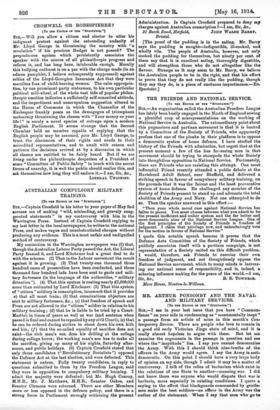1111, FRIENDS AND NATIONAL SERVICE. ran E717011 07 rim "Srmoraros.").
Sin,—An organization called the Australian Freedom League has lately been busily engaged in the North of England sowing a plentiful crop of misrepresentations on the working of National Service in Australia. The extraordinary point about this pugnacious and partisan movement is that it is backed by a Committee of the Society of Friends, who apparently profess that one of the planks in their platform is to oppose a democratic system of home defence. I have studied the history of the Friends with admiration, but regret that at the present moment a few of the less far-seeing men in that movement should be trying to stampede the whole Society into thoughtless opposition to National Service. Fortunately, there are Friends who arc resisting this attempt. One most influential Friend recently attended a public debate at the Hartahead Adult School, near Sheffield, and delivered a striking speech in favour of compulsory military training, on the grounds that it was the fairest and the least provocative system of home defence. He challenged any member of the Society of Friends present to stand up and advocate the total abolition of the Army and Navy. Not one attempted to do so. Then the speaker answered to this effect :— "Then your whole moral case against National Service has fallen to pieces. Yon must choose between what you admit to be the present inefficient and unfair system and the far better and more democratic aims of the National Service League. One of the first principles of the Society of Friends is freedom of judgment. I claim that privilege now, and unhesitatingly vote for the motion in favour of National Service."
I quote this notable speech because it proves that the Defence Acts Committee of the Society of Friends, which publicly associates itself with a partisan campaign, is not representative of a Society united on this difficult problem. I would, therefore, ask Friends to exercise their own freedom of judgment, and not thoughtlessly oppose the National Service movement, which to many minds is increas- ing our national sense of responsibility, and is, indeed, a sobering influence making for the peace of the world.—I am,
Sir, &e., B. S. Towwnox, Mere House, Newton-le-Willows.










































 Previous page
Previous page